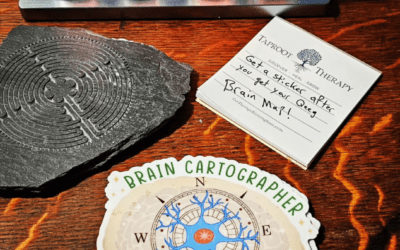Many therapists don’t bother with exit interviews when a patient’s treatment is concluded and the patient is terminating therapy. I find that they are helpful and that many of the tips that I collected from wizened therapists when I began my career came from insights that they had gleaned from patients in thorough exit interviews. Therapists fail only when they refuse to admit that the way they are trying to reach and assist patients in therapy is failing and thus refuse to change. When I give an exit interview to patients I always thank them for their honest feedback, and tell them that I can only improve when I know that I am making mistakes. Even if we are making small mistakes in therapy, we cannot improve until we ask patients what it is that is not helping them. The exit interview can help therapists, as well as patients recognize the most and least helpful parts of their own self systems and become more adaptable.
1. What are the biggest takeaways that you got from therapy?
2. Do you feel like the issues that you came into therapy with have been resolved? Which issues were resolved, and which were not?
3. Were there any problems that were resolved that you didn’t know were an issue when you began therapy?
4. What were the hardest parts of therapy for you? What could have happened in therapy to make those parts easier?
5. What are the times where you felt the least safe during the therapy process? Looking back, are there ways that I could have helped feel more safe.
6. If you could have changed your experience in therapy what would you have changed?
7. What were the expectations that you had for therapy that were not met.
8. What surprised you about your time in therapy?
9. Do you feel you have a good understanding of what interventions to continue after therapy that will continue your recovery. What are the main interventions you will continue after therapy?
10. Is there anything that you think we should have talked about in therapy that didn’t come up?
Bibliography:
Yalom, Irvin D. The Gift of Therapy: An Open Letter to a New Generation of Therapists and Their Patients. Harper Perennial, 2017.
Quintana, Susan M., and Geneva Holahan Wynne. “Adolescent-Parent Interaction in Authoritative Family Therapy: Parallels to Behaviors in the Psychotherapy Relationship.” Psychotherapy: Theory, Research, Practice, Training, vol. 20, no. 1, 1983, pp. 107–116.
Gelso, Charles J., and Jeffrey A. Hayes. Countertransference and the Therapist’s Inner Experience: Perils and Possibilities. Routledge, 2007.
Safran, Jeremy D., and J. Christopher Muran. Negotiating the Therapeutic Alliance: A Relational Treatment Guide. Guilford Press, 2000.
Levitt, Heidi M., et al. “The Therapeutic Relationship in LGBT Affirmative Therapy: A Qualitative Study.” Psychotherapy Research, vol. 25, no. 1, 2015, pp. 52-65.
Further Reading:
Bordin, Edward S. “The Generalizability of the Psychoanalytic Concept of the Working Alliance.” Psychotherapy: Theory, Research & Practice, vol. 16, no. 3, 1979, pp. 252-260.
Castonguay, Louis G., et al. “The Therapeutic Alliance in Internet-Delivered Depression and Anxiety Treatments: A Series of Case Studies.” Psychotherapy Research, vol. 23, no. 1, 2013, pp. 94-109.
Hoffman, Mark A., and Joanna Kruczek. “A Bioecological Model of Mass Trauma: Individual, Community, and Societal Effects.” The Counseling Psychologist, vol. 39, no. 8, 2011, pp. 1087-1127.
Stringer, Jacqueline V., et al. “Negotiating the Therapeutic Relationship in Ethnically Diverse Psychotherapy Dyads.” Psychotherapy Research, vol. 20, no. 5, 2010, pp. 585-595.
Eells, Tracy D. Handbook of Psychotherapy Case Formulation. Guilford Press, 2015.
Norcross, John C., and Bruce E. Wampold. “Evidence-Based Therapy Relationships: Research Conclusions and Clinical Practices.” Psychotherapy, vol. 48, no. 1, 2011, pp. 98–102.














0 Comments